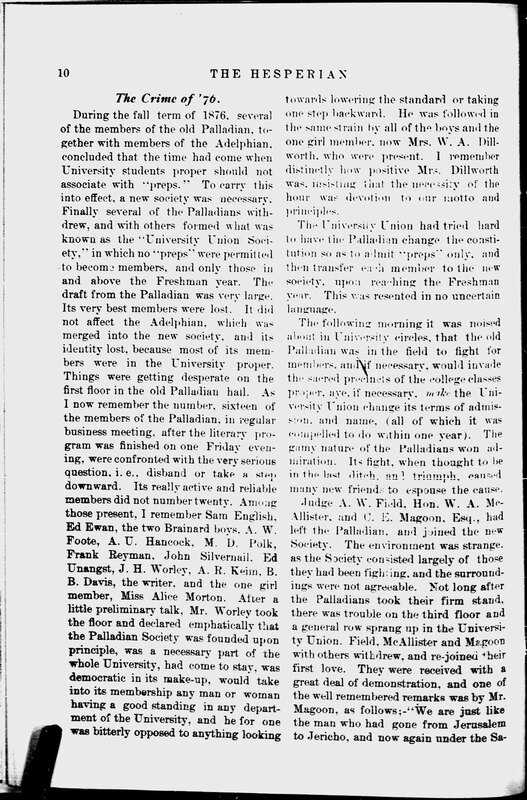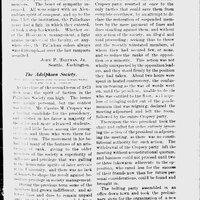-
Title
-
The Crime of '76.
-
Source
-
The Hesperian
"RG 38/01/02"
Periodical: Box: 3
Folder:
Archives and Special Collections, University of Nebraska-Lincoln Libraries
-
Rights
-
To inquire about usage, please contact Archives & Special Collections, University of Nebraska-Lincoln Libraries. These images are for educational use only. Not all images are available for publication.
-
extracted text
-
10 THE HESPERIAN
The Crime of ’76.
During the fall term of 1876, several
of the members of the old Palladian, to-
gether with members of the Adelphian,
concluded that the time had come when
University students proper should not
associate with ‘‘preps.”* To carry this
into effect, a new society was necessary.
Finally several of the Palladians with-
drew, and with others formed what was
known as the ‘Universi
ety,”’ in which no ‘‘preps
y Union Soci-
* were permitted
-to become members, and only those in
and above the Freshman year. The
draft from the Palladian was very large.
Its very best members were lost. It did
not affect the Adelphian, which was
merged into the new society, and its
identity lost, because most of its mem-
bers were in the University proper.
Things were getting desperate on the
first floor in the old Palladian hail. As
I now remember the number, sixteen of
the members of the Palladian, in regular
business meeting, after the literary pro-
gram was finished on one Friday even-
ing, were confronted with the very serious
question, i.e., disband or take a sten
downward. Its really active and reliable
members did not number twenty. Amoug
those present, I remember Sam English,
Ed Ewan, the two Brainard boys. A. W.
Foote, A.U. Hancock, M. D. Polk,
Frank Reyman, John Silvernail. Ed
Unangst, J. H. Worley, A. R. Kein, B.
B. Davis, the writer, and the one girl
member, Miss Alice Morton. After a
little preliminary talk, Mr. Worley took
the floor and declared emphatically that
the Palladian Society was founded upon
Principle, was a necessary part of the
whole University, had come to stay, was
democratic in its make-up, would take
into its membership any man or woman
having a good standing in any depart-
ment of the University, and he for one
was bitterly opposed to anything looking
towards lowering the standard or taking
one step backward. He was followed in
the same strain by all of the boys and the
one girl member, now Mrs. W. A. Dill-
worth, who were present. I remember
distinctly how positive Mrs. Dillworth
was, li!si y of the
hour was devotion to onr motto and
principles.
The Vuiversiiy Union had tried hard
to have the Palladian change the consti-
tution so as to almit ‘preps’? only, and
then transfer each member to the new
society, upon reaching the Freshman
This was resented in no uncertain
langnage.
ag that the nec
vear,
The following morning it was noised
about in University circles, that the old
Palladian was inthe field to fight for
members, and\f necessary, would invade
the s ‘ncts of the college classes
proper, ave. if necessary, mek: the Uni-
versity Union change its terms of admis-
ston, and name, (all of which it was
compelled to do within one year). The
gamy nature of the Palladians won ad-
Muiration. Its fight, when thought to be
in the last diteh, lt
many new friends to espouse the cause.
Judge A.W. Field, Hon. W. A. Me-
Allister, and C. 15. Magoon, Esq., had
left the Palladian, and joined the new
Society. The environment was strange.
as the Society consisted largely of those
they had been figh: ing, and the sarround-
ings were not agreeable. Not long after
the Palladians took their firm stand,
there was trouble on the third floor and
a general row sprang up in the Universi-
ty Union. Field, McAllister and Mzgoon
with others withdrew, and re-joined their
first love. They were received with 8
mph, eansed
great deal of demonstration, and one of
the well remembered remarks was by Mr.
Magoon, as follows;-‘‘We are just like
the man who had gone from Jerusalem
to Jericho, and now again under the Sa-
�




